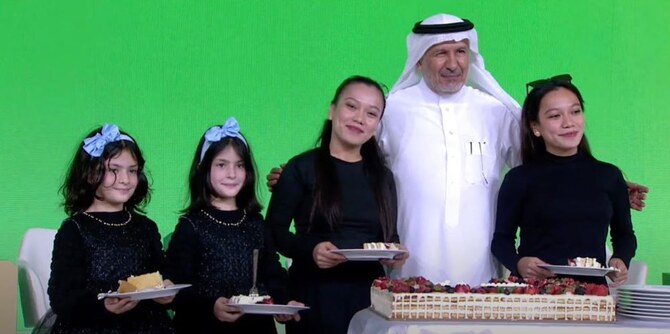RIYADH: Twenty years after they were separated in a complex surgery in Riyadh, two Filipino twins have returned to the Saudi capital to celebrate the medical expertise that saved their lives.
Princess Ann and Princess Mae Manzo stayed for more than six months in the Kingdom in 2004 as guests of Crown Prince Abdullah.
They were separated at Riyadh’s National Guard Hospital.
“After our separation, I gained a new appreciation for individuality and independence,” Princess Mae told the International Conference for Conjoined Twins on Monday.

Princess Ann and Princess Mae Manzo were separated at Riyadh’s National Guard Hospital in 2004. (Screengrab)
The event is the first of its kind in ∫£Ω«÷±≤•, a global leader in the field.
She was speaking during a panel discussion titled “Exploring the Multifaceted Impacts of Separation: Conjoined Twins and Families.”
The unique story of the Manzo twins proved the central focus of the discussion.
They are now thriving as third-year students in their native Philippines.
“While we still cherish the unique bond we share, it is a balance of gratitude for our shared paths and excitement for forging our path,” said Princess Mae.
The panel invited experts and family members to discuss the medical and psychological challenges of separating conjoined twins, as well as the broader social, educational and emotional implications.
Princess Anne said that the separation deeply impacted her and Mae’s emotional well-being.
“It has made us more self-aware individually, helping us understand our limits by living life separately with different groups of friends, different schools and different workplaces.”
Dr. Gopal Mitra, global lead on disability and development at UNICEF, highlighted stigmas surrounding conjoined twins, warning that an “obsession with normalcy” often leads to harmful stereotypes and social exclusion for those who are perceived as different.
“Stigma arises when we assign attributes and characteristics to groups of people based on our perceptions of difference — how they look, move, behave, or communicate.”
Mitra added that when a mother gives birth to conjoined twins, the family already faces stress and strain.
Strategies to combat negative perceptions include community engagement, the training of frontline workers and role modeling, he said, adding: “Princess Mae and Princess Ann are wonderful role models.”
Mitra said that inclusive education is a foundation for addressing stigma: “Inclusive education respects individuality and tailors learning experiences to the unique needs of each child.”
Dr. Ahmed Bawaneh, deputy country representative at IMC Jordan, highlighted the emotional and psychological challenges faced by conjoined twins and their families throughout separation and recovery.
“The stigma doesn’t go away after the separation. It’s there before, during and after. It’s something the twins and their families have to grapple with for a long time,” he said.
“It is important that we don’t look at conjoined twins as just special cases.”
After separation, long-term rehabilitation poses another challenge, requiring sustained support from mental health professionals, Bawaneh added.
“We must focus on the stressors they face and provide holistic, integrated support that addresses their mental, emotional and physical well-being. The importance of integrated mental health services cannot be overstated.”
The panel discussion served as both a celebration of progress and a call to action.
“The support system that I had was very helpful during the separation and recovery was my family,” the Manzo twins’ mother said.
Her words served as a reminder that behind every medical milestone is a network of caregivers who provide emotional strength, practical assistance and unwavering love.
“Inclusive education and an inclusive society are not just ideals but necessities — because every child deserves the chance to flourish,” Mitra said.
Preparing professionals to address unique patients is crucial, said Bawaneh.
“We must remember that these children and their families are not defined by their circumstances — they are individuals with dreams, challenges and incredible resilience.”














